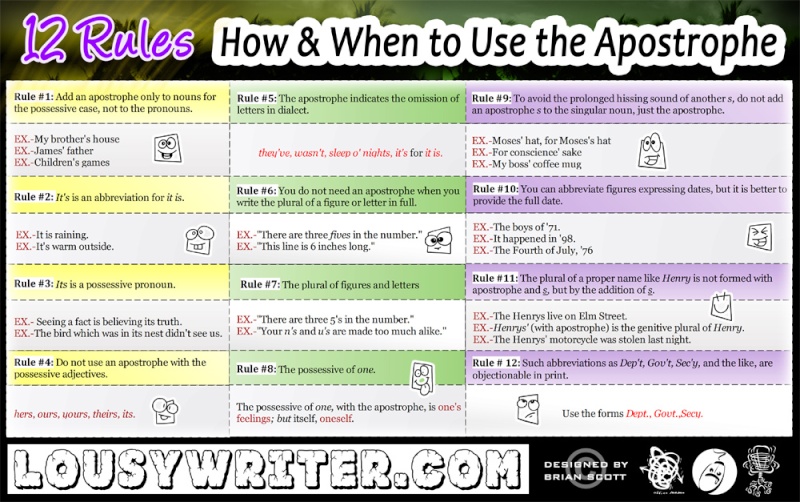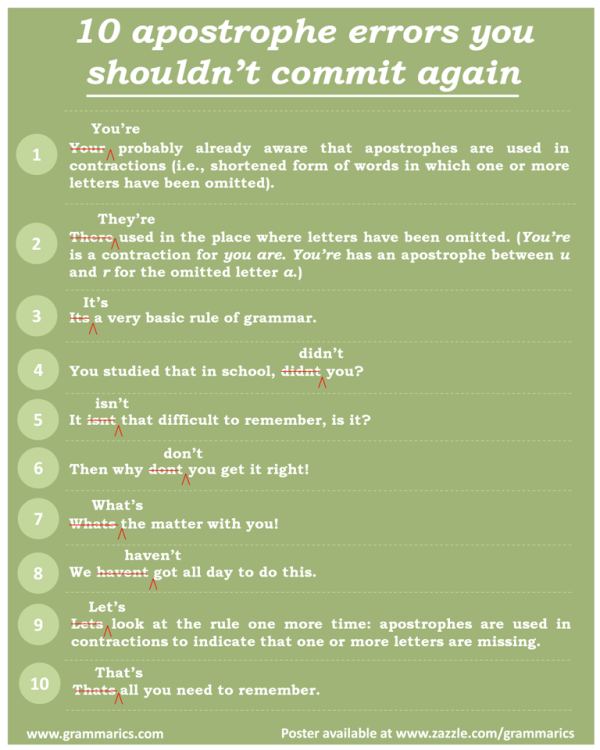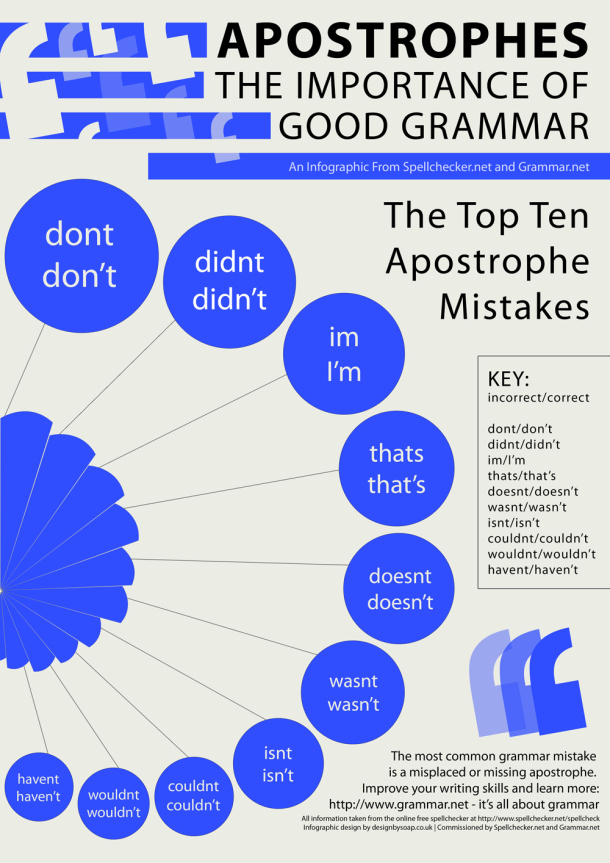PUNCTUATION - The Apostrophe
Page 1 of 1
 PUNCTUATION - The Apostrophe
PUNCTUATION - The Apostrophe
The apostrophe may be the simplest and yet most frequently misused mark of punctuation in English. Here we'll review six guidelines for using the mark correctly.
1. Use an Apostrophe to Show the Omission of Letters in a Contraction
Use the apostrophe to form contractions:
I'm (I am)
you're (you are)
he's (he is)
she's (she is)
it's* (it is)
we're (we are)
they're (they are)
isn't (is not)
aren't (are not)
can't (cannot)
don't (do not)
who's (who is)
won't (will not)
Be careful to place the apostrophe where the letter or letters have been omitted, which is not always the same place where the two words have been joined.
* Don't confuse the contraction it's (meaning, "it is") with the possessive pronoun its:
It's the first day of spring.
Our bird has escaped from its cage.
2. Use an Apostrophe with -s for Possessives of Singular Nouns
Use an apostrophe plus -s to show the possessive form of a singular noun, even if that singular noun already ends in -s:
Harold's crayon
my daughter's First Communion
Sylvia Plath's poetry
Dylan Thomas's poetry
today's weather report
the boss's problem
Star Jones's talk show
Victoria Beckham's husband
3. Use an Apostrophe Without -s for Possessives of Most Plural Nouns
To form the possessive of a plural noun that already ends in -s, add an apostrophe:
the girls' swing set (the swing set belonging to the girls)
the students' projects (the projects belonging to the students)
the Johnsons' house (the house belonging to the Johnsons)
If the plural noun does not end in -s, add an apostrophe plus -s:
the women's conference (the conference belonging to the women)
the children's toys (the toys belonging to the children)
the men's training camp (the training camp belonging to the men)
4. Use an Apostrophe with -s When Two or More Nouns Possess the Same Thing
When two or more nouns possess the same thing, add an apostrophe plus -s to the last noun listed:
Ben and Jerry's Cherry Garcia Ice Cream
Emma and Nicole's school project (Emma and Nicole worked together on the same project)
When two or more nouns separately possess something, add an apostrophe to each noun listed:
Tim's and Marty's ice cream (Each boy has his own ice cream.)
Emma's and Nicole's school projects (Each girl has her own project.)
5. Do Not Use an Apostrophe with Possessive Pronouns
Because possessive pronouns already show ownership, it's* not necessary to add an apostrophe:
yours
his
hers
its*
ours
theirs
However, we do add an apostrophe plus -s to form the possessive of some indefinite pronouns:
anybody's guess
one's personal responsibility
somebody's wallet
* Don't confuse the contraction it's (meaning, "it is") with the possessive pronoun its:
It's the first day of spring.
Our bird has escaped from its cage.
6. Generally, Do Not Use an Apostrophe to Form a Plural
As a general rule, use only an -s (or an -es) without an apostrophe to form the plurals of nouns--including dates, acronyms, and family names:
Markets were booming in the 1990s.
The tax advantages offered by IRAs make them attractive investments.
The Johnsons have sold all of their CDs.
To avoid confusion, we may occasionally need to use apostrophes to indicate the plural forms of certain letters and expressions that are not commonly found in the plural:
Mind your p's and q's.
Let's accept the proposal without any if's, and's, or but's.
http://grammar.about.com/od/punctuationandmechanics/tp/GuideApostrophe.htm
1. Use an Apostrophe to Show the Omission of Letters in a Contraction
Use the apostrophe to form contractions:
I'm (I am)
you're (you are)
he's (he is)
she's (she is)
it's* (it is)
we're (we are)
they're (they are)
isn't (is not)
aren't (are not)
can't (cannot)
don't (do not)
who's (who is)
won't (will not)
Be careful to place the apostrophe where the letter or letters have been omitted, which is not always the same place where the two words have been joined.
* Don't confuse the contraction it's (meaning, "it is") with the possessive pronoun its:
It's the first day of spring.
Our bird has escaped from its cage.
2. Use an Apostrophe with -s for Possessives of Singular Nouns
Use an apostrophe plus -s to show the possessive form of a singular noun, even if that singular noun already ends in -s:
Harold's crayon
my daughter's First Communion
Sylvia Plath's poetry
Dylan Thomas's poetry
today's weather report
the boss's problem
Star Jones's talk show
Victoria Beckham's husband
3. Use an Apostrophe Without -s for Possessives of Most Plural Nouns
To form the possessive of a plural noun that already ends in -s, add an apostrophe:
the girls' swing set (the swing set belonging to the girls)
the students' projects (the projects belonging to the students)
the Johnsons' house (the house belonging to the Johnsons)
If the plural noun does not end in -s, add an apostrophe plus -s:
the women's conference (the conference belonging to the women)
the children's toys (the toys belonging to the children)
the men's training camp (the training camp belonging to the men)
4. Use an Apostrophe with -s When Two or More Nouns Possess the Same Thing
When two or more nouns possess the same thing, add an apostrophe plus -s to the last noun listed:
Ben and Jerry's Cherry Garcia Ice Cream
Emma and Nicole's school project (Emma and Nicole worked together on the same project)
When two or more nouns separately possess something, add an apostrophe to each noun listed:
Tim's and Marty's ice cream (Each boy has his own ice cream.)
Emma's and Nicole's school projects (Each girl has her own project.)
5. Do Not Use an Apostrophe with Possessive Pronouns
Because possessive pronouns already show ownership, it's* not necessary to add an apostrophe:
yours
his
hers
its*
ours
theirs
However, we do add an apostrophe plus -s to form the possessive of some indefinite pronouns:
anybody's guess
one's personal responsibility
somebody's wallet
* Don't confuse the contraction it's (meaning, "it is") with the possessive pronoun its:
It's the first day of spring.
Our bird has escaped from its cage.
6. Generally, Do Not Use an Apostrophe to Form a Plural
As a general rule, use only an -s (or an -es) without an apostrophe to form the plurals of nouns--including dates, acronyms, and family names:
Markets were booming in the 1990s.
The tax advantages offered by IRAs make them attractive investments.
The Johnsons have sold all of their CDs.
To avoid confusion, we may occasionally need to use apostrophes to indicate the plural forms of certain letters and expressions that are not commonly found in the plural:
Mind your p's and q's.
Let's accept the proposal without any if's, and's, or but's.
http://grammar.about.com/od/punctuationandmechanics/tp/GuideApostrophe.htm

Vincent Law- Advanced Fluency

- Posts : 1537
Join date : 2011-12-22
Age : 50
Location : Philadelphia
 PUNCTUATION - Apostrophe (’)
PUNCTUATION - Apostrophe (’)
Are you uncertain about when to use an apostrophe? Many people have difficulty with this punctuation mark. The best way to get apostrophes right is to understand when and why they are used.
People are often unsure about whether they should use "its" (without an apostrophe) or "it’s" (with an apostrophe).
- Apostrophes showing possession
You use an apostrophe to show that a thing or person belongs or relates to someone or something: instead of saying "the party of Ben" or "the weather of yesterday", you can write "Ben’s party" and "yesterday’s weather."
Here are the main guidelines for using apostrophes to show possession:
- Singular nouns and most personal names
With a singular noun or most personal names: add an apostrophe plus 's':
"We met at Ben’s party."
"The dog’s tail wagged rapidly."
"Yesterday’s weather was dreadful."
- Personal names that end in '–s'
With personal names that end in '-s': add an apostrophe plus 's' when you would naturally pronounce an extra 's' if you said the word out loud:
"He joined Charles’s army in 1642."
"Dickens's novels provide a wonderful insight into Victorian England."
"Thomas's brother was injured in the accident."
Note that there are some exceptions to this rule, especially in names of places or organizations, for example:
"St Thomas’ Hospital"
If you aren’t sure about how to spell a name, look it up in an official place such as the organization’s website.
With personal names that end in '-s' but are not spoken with an extra 's': just add an apostrophe after the [i'-s'[/i]:
"The court dismissed Bridges' appeal."
"Connors' finest performance was in 1991."
- Plural nouns that end in '–s'
With a plural noun that already ends in '-s': add an apostrophe after the 's':
"The mansion was converted into a girls’ school."
"The work is due to start in two weeks’ time."
"My duties included cleaning out the horses’ stables."
- Plural nouns that do not end in '-s'
With a plural noun that doesn’t end in '–s': add an apostrophe plus 's':
"The children’s father came round to see me."
"He employs 14 people at his men’s clothing store."
The only cases in which you do not need an apostrophe to show belonging is in the group of words called possessive pronouns - these are the words 'his', 'hers', 'ours', 'yours', 'theirs' (meaning ‘belonging to him, her, us, you, or them’) - and with the possessive determiners. These are the words 'his', 'hers', 'its', 'our', 'your', 'their' (meaning 'belonging to or associated with 'him', 'her', 'it', 'us', 'you', or 'them').
- Apostrophes showing omission
An apostrophe can be used to show that letters or numbers have been omitted. Here are some examples of apostrophes that indicate missing letters:
"I’m" - short for 'I am'
"he’ll"[i/] - short for [i]'he will'
"she’d" – short for 'she had' or 'she would'
"pick ’n’ mix" - short for 'pick and mix'
"it’s hot" - short for 'it is hot'
"didn’t" - short for 'did not'
It also shows that numbers have been omitted, especially in dates, e.g. "the Berlin Wall came down in the autumn of ’89" (short for 1989).
- It’s or its?
These two words can cause a lot of confusion: many people are uncertain about whether or not to use an apostrophe. These are the rules to remember:
'its' (without an apostrophe) means ‘belonging to it’:
"The dog wagged its tail."
"Each case is judged on its own merits."
'it’s' (with an apostrophe) means ‘it is’ or ‘it has’:
"It’s been a long day."
"It’s cold outside."
"It’s a comfortable car and it’s got some great gadgets."
- Apostrophes and plural forms
The general rule is that you should not use an apostrophe to form the plurals of nouns, abbreviations, or dates made up of numbers: just add '-s' (or '-es', if the noun in question forms its plural with '-es').
It's very important to remember this grammatical rule.
There are one or two cases in which it is acceptable to use an apostrophe to form a plural, purely for the sake of clarity:
- you can use an apostrophe to show the plurals of single letters:
"I've dotted the i's and crossed the t's."
"Find all the p's in appear."
- you can use an apostrophe to show the plurals of single numbers:
"Find all the number 7’s."
These are the only cases in which it is generally considered acceptable to use an apostrophe to form plurals: remember that an apostrophe should never be used to form the plural of ordinary nouns, names, abbreviations, or numerical dates.
http://oxforddictionaries.com/words/apostrophe

Vincent Law- Advanced Fluency

- Posts : 1537
Join date : 2011-12-22
Age : 50
Location : Philadelphia

Vincent Law- Advanced Fluency

- Posts : 1537
Join date : 2011-12-22
Age : 50
Location : Philadelphia

Vincent Law- Advanced Fluency

- Posts : 1537
Join date : 2011-12-22
Age : 50
Location : Philadelphia
Page 1 of 1
Permissions in this forum:
You cannot reply to topics in this forum






